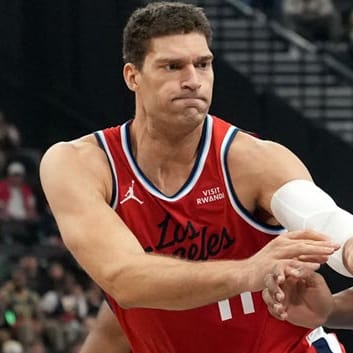Eighty-two games is a lot. Some say too many. But the NBA isn't one long year. There are small fragments of seasons, which have their own pieces of information and their own storylines - and that's what meshes together to create a full NBA season.
Paul George, for example, has already played through two mini-seasons this year. The Pacers started off 9-9 (8-9 in games George played in) and the third-year player, who was expected to carry the team after Danny Granger went down, got off to a dreadful start. In 34.7 minutes per game, George averaged 13.5 points, 6.5 rebounds, and 3.4 assists, while shooting only 38.5 percent from the field and 36.7 percent from three. Not awful numbers, but not good. And definitely not what you'd hope from a player expected to make "the leap" on a team in which he can be the leading scorer. But that wasn't George's season. It was just another one of those NBA mini-seasons.
Since Dec. 4, when the Pacers sat dissatisfied at 9-9, Indiana has reeled off a 16-7 hot streak and guess whose numbers have shot up since. If you're curious, it's George.
23 games.
38 minutes per game.
20.1 points per game.
8.7 rebounds per game.
3.8 assists per game.
44.8 percent from the field.
39.6 percent from three.
By George, I think he's got it!
Overall, George's numbers don't look nearly as impressive, though, and that's mainly because of his first mini-season of the year. Basically, he
Eighty-two games is a lot. Some say too many. But the NBA isn't one long year. There are small fragments of seasons, which have their own pieces of information and their own storylines - and that's what meshes together to create a full NBA season.
Paul George, for example, has already played through two mini-seasons this year. The Pacers started off 9-9 (8-9 in games George played in) and the third-year player, who was expected to carry the team after Danny Granger went down, got off to a dreadful start. In 34.7 minutes per game, George averaged 13.5 points, 6.5 rebounds, and 3.4 assists, while shooting only 38.5 percent from the field and 36.7 percent from three. Not awful numbers, but not good. And definitely not what you'd hope from a player expected to make "the leap" on a team in which he can be the leading scorer. But that wasn't George's season. It was just another one of those NBA mini-seasons.
Since Dec. 4, when the Pacers sat dissatisfied at 9-9, Indiana has reeled off a 16-7 hot streak and guess whose numbers have shot up since. If you're curious, it's George.
23 games.
38 minutes per game.
20.1 points per game.
8.7 rebounds per game.
3.8 assists per game.
44.8 percent from the field.
39.6 percent from three.
By George, I think he's got it!
Overall, George's numbers don't look nearly as impressive, though, and that's mainly because of his first mini-season of the year. Basically, he had a bad November and it all changed after that. It would be reasonable to expect George's second mini-season to continue throughout January and into the rest of the year. Perfectly reasonable.
Circumstances have changed. He's finally realized he can be The Man. He's developing. He's making smarter plays. He's smothering on defense. George has changed and he should be treated as such. It's a new mini-season.
So if we're going to treat George like a fantasy stud, that means we have to give others the same respect when it comes to their evolving mini-seasons.
Cue: Dion Waiters.
Waiters' first 17 games of the season were just appalling. I mean, really awful. It wasn't that he was putting up disgraceful raw numbers. He was just so reckless and irresponsible with the ball. As of Dec. 1, he was shooting 36.3 percent from the field on 15.1 field goal attempts per game. So yeah, not preferable.
At that time, Waiters went out with an ankle sprain. He missed a little more than two weeks, returning on Dec. 18. Before he returned, owners should have been watching out for Waiters because of the inefficient way he was scoring his points when he did actually get the ball in the hoop.
The biggest issue wasn't that he was shooting 36.3 percent from the field. It was that almost all his points were coming on jumpers. At the collegiate level, when Waiters was a sixth man, he got his points at the rim anyway he could. That meant slashing, penetrating, driving, and getting out in transition. But at the NBA level, he was settling for jumpers and that wasn't going to hold up. Just as numbers tend to regress to the mean, Waiters' numbers were bound to progress there.
In his first 17 NBA games, Waiters shot a well-below league average 38.6 percent at the rim. He was at only 36.3 percent in the restricted area and even more worrisome, he shot 34.4 percent in transition. Those numbers were shocking, especially the ones that said he barely made more than a third of his shots on fast breaks, the area of the game that was supposed to be his strongest. They had to get better. They just had to.
And guess what? They have.
Waiters still isn't efficient, but he's getting darn close. There are massive developments. He's up to 48.6 percent at the rim and 45.4 percent in the restricted area. Meanwhile, he's improved his transition game the most and is now over 50 percent, shooting 53 percent in transition and averaging 1.17 points per possession in fast breaks - making Waiters one of the 100 most efficient fast-break scorers in the league.
It's about mini-seasons.
And Waiters' new mini-season has him coming off the bench.
It's hard to say exactly why Waiters has been so much better since being pulled from the starting lineup, but the production has irrefutably improved since he parked himself to start games. Waiters in 25 starts:
31.6 minutes per game.
15.9 points per 36.
2.7 rebounds per 36.
4.0 assists per 36.
36.3 percent from the field.
32.8 percent from three.
73.4 percent from the line.
After those 25 starts, it became relatively clear that Waiters did not play well with Kyrie Irving - at least at this point in his career.
Waiters wants the ball. Kyrie wants the ball. But there's only one ball. So what do you do? Someone goes to the bench. And it seems like that stream of logic has turned around Waiters' season.
Waiters in nine games off the bench:
26.6 minutes per game.
23.1 points per 36.
3.5 rebounds per 36.
2.8 assists per 26.
43.8 percent from the field.
32.0 percent from three.
85.1 percent from the line.
There's your improvement. There's your efficiency.
Who knows if this change fully has to do with playing without Irving? It's hard to say, even after watching the two play together on the same court. Irving missed some time earlier this year and Waiters did not become nearly as productive as he has been off the bench, chucking up some 7-for-22 and 9-for-22 performances en route to Irving's return.
Maybe Waiters is just more comfortable on the bench. He never once started a game in college and was the best sixth man in the nation for a No. 1 seed in the NCAA Tournament last season. He was a brilliant sparkplug, one for which the phrase "instant offense" seemed to be created.
Maybe his improvement has nothing to do with heading to the bench. Maybe it's just coincidence. Perhaps something finally clicked. Waiters has been playing far more controlled basketball over his previous nine games. In his first 25, he'd find himself aimlessly running around the court, more often than not looking for an ugly jump shot. Those shots didn't fall and for good reason. It was Dion's version of the Run Around Sue and it wasn't working.
Now, his story is no longer sad, but true. Coach Byron Scott has minute-managed wonderfully. Waiters isn't seeing heavy minutes regardless of his performance. He is rigidly staying in the same role, something that wasn't true earlier in the season when he slipped around wearing multiple different hats.
Even in last week's 33-point performance against the Kings - when Waiters shot 12-for-18 from the field - he saw the court for only 29 minutes. Eventually, though, if Waiters continues to produce, those 26.6 minutes per game off the bench will start to go up. 34 minutes would probably be a stretch, something that only wishful thinkers might consider a possibility, but a James Harden-like role (in Oklahoma City, of course) might make sense for Waiters in Cleveland. And if he gets another mini-season, one in which he closes in on that 30 minutes a game mark off the bench, he could sneakily become a valuable fantasy asset for the remainder of the year.
Fred Katz is an NBA writer for RotoWire. Contact him on Twitter at @FredKatz.









































